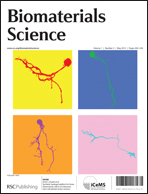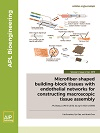
Biomaterials Science
Scope & Guideline
Transforming ideas into impactful biomaterials for tomorrow's challenges.
Introduction
Aims and Scopes
- Tissue Engineering and Regenerative Medicine:
Research in this area includes the development of scaffolds, hydrogels, and other materials that promote tissue regeneration and repair, often incorporating growth factors and bioactive molecules. - Drug Delivery Systems:
The journal covers the design and characterization of nanoparticles, liposomes, and hydrogels for targeted and controlled delivery of therapeutic agents, including chemotherapeutics and biologics. - Nanotechnology in Biomedicine:
Publications focus on the synthesis and application of nanomaterials, including quantum dots, metal-organic frameworks, and nanocomposites for imaging, diagnostics, and therapy. - Smart and Responsive Biomaterials:
Research on materials that respond to environmental stimuli (e.g., pH, temperature, light) for applications in drug delivery, wound healing, and cancer therapy. - Biomaterials for Infection Control:
This area emphasizes the development of antimicrobial coatings, hydrogels, and other materials designed to prevent or treat infections, particularly in surgical and implant scenarios. - Biocompatibility and Safety Evaluation:
Studies assessing the biocompatibility, toxicity, and long-term stability of biomaterials in vivo, ensuring safety for clinical applications.
Trending and Emerging
- Personalized Medicine and Targeted Therapies:
There is a growing emphasis on developing personalized therapeutic solutions using biomaterials, especially for cancer treatment, where targeted drug delivery systems are being tailored to individual patient profiles. - 3D Bioprinting and Tissue Models:
Research in 3D bioprinting technologies and the creation of complex tissue models is rapidly increasing, highlighting the potential for innovative therapeutic applications and disease modeling. - Micro and Nano-Scale Systems:
The emergence of micro and nano-scale biomaterials for applications in diagnostics, targeted drug delivery, and regenerative medicine reflects a trend towards miniaturization and precision medicine. - Biomaterial-Cell Interactions:
Enhanced understanding of how biomaterials interact with cells, including the modulation of immune responses and cellular behavior, is a significant focus area, particularly in the context of tissue engineering. - Sustainable and Green Biomaterials:
The development of environmentally friendly biomaterials derived from renewable resources is gaining traction, reflecting a broader trend towards sustainability in material science. - Smart Biomaterials with Responsive Functions:
Research is increasingly focused on materials that can respond dynamically to environmental changes (e.g., pH, temperature), allowing for advanced applications in drug delivery and tissue engineering.
Declining or Waning
- Traditional Biomaterials:
Research on conventional materials like metals and ceramics for implants is decreasing as newer biomaterials, particularly bioactive and smart materials, gain attention. - Basic Polymer Studies:
There is a noticeable decline in studies focused solely on the synthesis and characterization of basic polymers without clear applications, as the field shifts towards more applied research. - Generalized Drug Delivery Systems:
Research that does not specify targeting mechanisms or novel delivery strategies is becoming less prominent, with a trend towards more specialized and targeted approaches.
Similar Journals

JOURNAL OF BIOMATERIALS APPLICATIONS
Innovating the future of biomedical applications.JOURNAL OF BIOMATERIALS APPLICATIONS, published by SAGE PUBLICATIONS LTD, serves as a pivotal platform for the dissemination of cutting-edge research in the field of biomaterials and biomedical engineering. With an ISSN of 0885-3282 and an E-ISSN of 1530-8022, this journal has been a respected venue for scholarly communication since its inception in 1986. Aiming to provide comprehensive insights into the applications of biomaterials, this journal publishes high-quality articles that explore innovative materials and methodologies, thereby fostering advancements in medical technology and tissue engineering. The journal consistently ranks in the third quartile (Q3) for both Biomaterials and Biomedical Engineering categories, strengthening its position among the noteworthy academic resources available today. With a dedicated readership comprising researchers, industry professionals, and students, JOURNAL OF BIOMATERIALS APPLICATIONS plays a vital role in supporting knowledge exchange and scientific progress within these dynamic fields.

Asian Journal of Pharmaceutical Sciences
Empowering discoveries in the realm of pharmaceutical sciences.Asian Journal of Pharmaceutical Sciences is a prestigious open-access journal published by Shenyang Pharmaceutical University, dedicated to advancing research and developments in the field of pharmaceutical sciences. Since its inception in 2009, the journal has successfully converged a wealth of knowledge and innovation, demonstrating an impressive track record with its open access model adopted in 2013, ensuring global dissemination of crucial research findings. With an outstanding impact factor and consistently ranked in the Q1 category for both Pharmaceutical Science and Pharmacology in 2023, it ranks among the top journals in its field, as evidenced by its impressive Scopus rankings—4th out of 183 in Pharmaceutical Science and 10th out of 313 in Pharmacology, showcasing its high relevance and credibility (98th and 96th percentiles respectively). Researchers, professionals, and students can access a diverse array of articles that encompass groundbreaking studies, reviews, and reports, solidifying the journal's position as a vital resource for anyone engaged in pharmaceutical research. With its commitment to quality and accessibility, Asian Journal of Pharmaceutical Sciences plays an essential role in fostering innovation and collaboration within the global scientific community.

Acta Biomaterialia
Innovating at the Intersection of Biology and EngineeringActa Biomaterialia, published by Elsevier Science Ltd, is a leading journal in the fields of biochemistry, biomaterials, biomedical engineering, biotechnology, and molecular biology. With an ISSN of 1742-7061 and an E-ISSN of 1878-7568, this prestigious journal has secured a remarkable position in the academic community, evidenced by its inclusion in the Q1 category across multiple disciplines for 2023. It ranks impressively at #21 in biochemistry, #16 in biomedical engineering, #18 in biotechnology, and #11 in biomaterials, reflecting its high impact and relevance to ongoing research and development. The journal provides a platform for disseminating innovative research and advancements in the design and application of biomaterials, contributing to scientific discussions that propel the field forward. Although it does not currently offer open access options, Acta Biomaterialia continues to attract contributions that advance our understanding of biomaterials and their interactions with biological systems, ensuring that researchers, professionals, and students remain informed about the latest trends and breakthroughs in this rapidly evolving area of study.

Materials
Pioneering discoveries in materials science for global impact.Materials is an esteemed journal published by MDPI, dedicated to advancing the fields of Condensed Matter Physics and Materials Science. With its commitment to Open Access since its inception in 2008, the journal has made significant strides in disseminating high-quality research globally, allowing researchers, professionals, and students easy access to cutting-edge studies without financial barriers. Hailing from Switzerland, the journal has shown remarkable growth and prominence, currently ranked in the Q2 quartile in its categories according to the latest assessments, which highlights its impact within the community. As the journal converges its focus from 2008 to 2024, it aims to continually foster a robust exchange of knowledge on innovative materials and their applications, thereby supporting the evolving landscape of science and technology. With an E-ISSN of 1996-1944 and a user-friendly platform, Materials is poised to be a leading choice for scholars eager to contribute to and engage with pioneering research.

Journal of Tissue Engineering and Regenerative Medicine
Exploring breakthroughs in biomaterials and regenerative therapies.Journal of Tissue Engineering and Regenerative Medicine, published by WILEY, stands as a pivotal platform in the fields of biomaterials, biomedical engineering, and regenerative medicine. With an ISSN of 1932-6254 and an E-ISSN of 1932-7005, this journal, based in the United Kingdom, has consistently delivered high-quality research since its inception in 2006, converging critical insights through 2024. With an impressive citation profile reflected in its Scopus rankings—specifically a rank of #58 in Medicine and #75 in Biomedical Engineering—the journal is acknowledged for its substantial impact, as demonstrated by its competitive quartile standings in 2023. Notably, it maintains a Q3 ranking in Biomaterials and Q2 in both Biomedical Engineering and Medicine (miscellaneous), showcasing its influence and relevance in the rapidly evolving interplay between engineering and medicine. The journal serves as a vital resource for researchers and practitioners aiming to stay abreast of innovations and breakthroughs in regenerative therapies, tissue scaffolds, and biomaterials. While not an open-access publication, it fosters academic dialogue and knowledge dissemination that is crucial for advancing the field.

Advanced Healthcare Materials
Innovating for a Healthier TomorrowAdvanced Healthcare Materials, published by WILEY, is a leading journal in the interdisciplinary fields of biomaterials, biomedical engineering, and pharmaceutical science. With its ISSN 2192-2640 and E-ISSN 2192-2659, the journal provides a platform for innovative research that encompasses the design, fabrication, and application of advanced materials in healthcare settings. Recognized for its high impact, it boasts a Q1 ranking in several categories, including a notable rank of #7/183 in Pharmaceutical Science and 14/137 in Biomaterials according to Scopus rankings. This reflects the journal’s commitment to publishing cutting-edge studies that push the boundaries of science and technology in medicine. Although it operates under a subscription model, articles published in this journal significantly impact the global research community and play a crucial role in the advancement of healthcare technologies. With a publication history from 2012 to 2024, Advanced Healthcare Materials remains an essential resource for researchers, professionals, and students engaged in the groundbreaking intersections of materials science and healthcare.

ACS Biomaterials Science & Engineering
Fostering Innovation Through Rigorous Research and CollaborationACS Biomaterials Science & Engineering, published by the American Chemical Society, serves as a premier platform for the latest advancements and research in the fields of biomaterials and biomedical engineering. With an impressive impact factor and a strong reputation reflected in its ranking—Q2 in Biomaterials and Q1 in Biomedical Engineering—the journal attracts a diverse and engaged readership. Since its inception in 2015, it has aimed to foster innovation by publishing high-quality research articles, reviews, and perspectives on the synthesis, characterization, and application of biomaterials. Researchers and professionals benefit from the journal's rigorous peer-review process and its focus on translational science, making it essential for those looking to stay at the forefront of biomaterials research. Located in Washington, DC, USA, the journal plays a pivotal role in connecting academic and industrial sectors, ultimately driving advancements that impact biomedicine and related fields.

Bioactive Materials
Unlocking the Potential of Bioactive Materials for a Healthier FutureBioactive Materials, published by KEAI PUBLISHING LTD, stands as a leading Open Access journal in the fields of Biomaterials, Biomedical Engineering, and Biotechnology. Since its inception in 2016, this journal has rapidly ascended in prominence, currently holding a prestigious Q1 category ranking across multiple disciplines, reflecting its significant impact within the scientific community. With its E-ISSN 2452-199X, it spans a broad spectrum of research areas, contributing valuable insights to the ongoing discourse in bioactive materials and their applications. The journal's superior Scopus rankings further illustrate its influence, boasting impressive standings in engaging niches such as engineering and molecular biology. Bioactive Materials offers a vital platform for researchers, professionals, and students to disseminate and acquire cutting-edge knowledge, thus fostering innovation and collaboration in the rapidly evolving terrain of biomedicine. Its commitment to Open Access since 2016 enhances accessibility, ensuring that the burgeoning advancements in this field reach a global audience.

APL Bioengineering
Empowering Discoveries in Bioengineering and BeyondAPL Bioengineering is a premier open-access journal published by AIP Publishing, dedicated to advancing the field of bioengineering and its interdisciplinary applications. Established in 2017, this journal serves as a vital platform for researchers, professionals, and students interested in the critical intersections of bioengineering, biomaterials, biomedical engineering, and biophysics. With an impressive impact factor and consistent rankings in the Q1 category across multiple domains, including biochemistry and materials science, APL Bioengineering has positioned itself among the top journals in its field. The journal aims to publish innovative original research, comprehensive reviews, and insightful case studies that further the understanding and application of bioengineering principles. Since its inception, APL Bioengineering has fostered a community of thought leaders, providing open access to ensure broad dissemination of knowledge and advancements that underpin the future of biomedical innovation.

JOURNAL OF BIOMATERIALS SCIENCE-POLYMER EDITION
Advancing the frontiers of polymer biomaterials.JOURNAL OF BIOMATERIALS SCIENCE-POLYMER EDITION, published by Taylor & Francis Ltd, is a distinguished scholarly journal dedicated to the exploration of biomaterials and their applications in various fields such as bioengineering, biomedical engineering, and biophysics. With an ISSN of 0920-5063 and an E-ISSN of 1568-5624, this journal offers a platform for researchers and professionals to share innovative findings and methodologies that advance the science of polymer-based biomaterials. The journal's impact within the academic community is underscored by its notable Scopus rankings, including a Q2 status in both Biomedical Engineering and Biophysics as of 2023, reflecting its significant contribution to advancing knowledge and practice in these fields. The scope of the journal spans from fundamental research to applications in medical devices and regenerative medicine, ensuring comprehensive coverage of the latest trends and breakthroughs. Although it does not currently offer open access options, the journal remains a pivotal resource for students, researchers, and professionals committed to the development and application of biomaterials in healthcare. For further details, the journal is based in Abingdon, United Kingdom, at 2-4 Park Square, Milton Park, OX14 4RN.